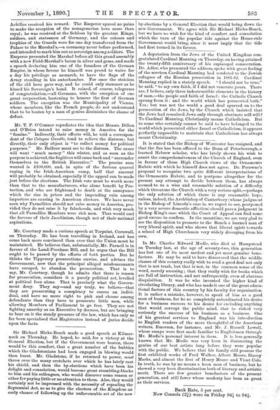In Mr. Charles Edward Mudie, who died at Hampstead on
Tuesday last, at the age of seventy-two, this generation has lost one of its most modest and yet most genuine bene- factors. He may be said to have discovered that the middle classes of this country really wish to read a good deal not only that is not trash, but that is not, in the common sense of the word, merely amusing ; that they really wish for books which are full of instruction, and not unfrequently, even of abstruse disquisition. It was he who invented the higher kind of circulating library, and who has made it one of the great educa- tional factors of this country by his faculty for organisation. It is rather a mistake, however, to speak of him as a good man of business, for he so completely subordinated his desire for a business success to his desire for excluding anything that would corrupt the public mind, that he risked very seriously the success of his business as a business. One of his greatest services to England was his introduction to English readers of the more thoughtful of the American writers, Emerson, for instance, and Mr. J. Russell Lowell, whose essays were first made familiar to Englishmen through Mr. Mudie's personal interest in them. It is less generally known that Mr. Mudie was very keen in discovering the genius of our best artists long before they were popular with the public. We believe that his family still possess the first exhibited works of Fred Walker, Albert Moore, Stacey Marks, and almost the first of Henry Moore and Vicat Cole. In truth, he was by no means a keen man of business, but he showed a very keen discrimination both of literary and artistic merit. There are few greater benefactors of the present generation, and still fewer whose modesty has been as great as their services.


















































 Previous page
Previous page